Genre: Action/Sci-Fi/Period
Premise: When an alien predator arrives on earth in 1719, it sets its sights on the great warriors of the Comanche nation, only to learn that one of them, a young woman, might be more than he can handle.
About: This movie comes from Dan Trachtenberg, who I’ve been a fan of all the way back to his “Portal” short film days, and then when he went on to make 10 Cloverfield Lane. I was surprised when his career stalled so I was very happy to hear he was entrusted with a franchise as iconic as The Predator. The script for Prey was written by Patrick Aison, best known for his work on Wayward Pines. The film cast the single coolest last name in all of Hollywood for its female lead warrior, Amber Midthunder.
Writers: Patrick Aison and Dan Trachtenberg (characters by Jim & John Thomas)
Details: 99 minutes

I was all over this when it was first announced.
I think my exact words were, “This is how you bring something fresh to an old franchise!”
The basic plot for Prey is that it’s America circa 1719 when the Comanche reigned. A young female member of a Comanche tribe named Naru isn’t happy that her male tribe members get to hunt and she doesn’t. So she’s always trying to tag along on their hunting excursions.
As the group attempts to hunt down a lion that maimed one of their tribe members, Naru sees a monster that easily kills a wolf, and later a bear. If it wasn’t hard enough to get her tribe to accept her, an insistence that monsters are in the woods isn’t helping.
So Naru goes out to hunt this thing (with her trusty dog) and finds herself, instead, out in the middle of nowhere being hunted. She will need to become her best hunter self if she has any chance at defeating… the predator.
I suspect that if I’d never seen the original Predator, I would’ve liked this movie a lot more.
I bring that up because, obviously, there are a ton of people watching Prey who’ve never seen the original film. To them, this will be new, fresh, and exciting.
But for me, having seen the first film, I was constantly comparing the two and, as a result, running into a lot of questions that didn’t have good answers.
What was so great about that first film was that it was a metaphor for American military might at the time and how muscles, machismo, and endless firepower could defeat anything – until it couldn’t.
Schwarzenegger’s “Dutch,” was a killing machine. Six foot two, 250 pounds of pure muscle, an unstoppable soldier who was both strong and smart. Yet he had to battle this alien tooth and nail all over the jungle just to barely – and I mean BARELY – beat him. You got the sense that there wasn’t a single other person on the planet who could’ve done what he did that day.
Yet now we’re supposed to believe that a 100 pound girl with bow and arrows is going to defeat a Predator?
Strangely, the screenplay leans into that. It knows its main character is tiny and unqualified, which creates the key screenwriting difference between the two films. As a screenwriter, you need to understand how these opposing choices changed each movie.
In one, the main character is already the strongest, and the movie sets about proving that he’s weaker than he thinks. In the other, the main character starts out weak, and the movie sets about proving that she’s stronger than we think.
It’s an interesting comparison – asking which starting point is better. Because, in theory, the underdog starting point should be better. And that’s “Prey.” But I enjoyed the original so much more because it was fun seeing our characters realize they were overmatched and, only then, become underdogs.
I, for one, would’ve loved if they’d gone more of the original movie’s route and made this Comanche tribe bada$$es.
The Comanche, let us not forget, were fearless and ruthless warriors who killed without remorse. Author SC Gwynn, who wrote a book on the Comanche, said this about them: “No tribe in the history of the Spanish, French, Mexican, Texan, and American occupations of this land had ever caused so much havoc and death. None was even a close second.”
Yet if this movie was your entry point into the Comanche, you’d think they were a sweet-natured group of malnourished, sometimes clumsy, teenagers, who put a premium on joke-telling. I mean, weren’t the Comanche the most skilled horse-riders in all of American history? Yet where are the horses here? Horse vacay?
Hollywood is probably terrified of portraying any Native American group as negative but it sure would’ve been nice to AT LEAST see the tribe kick some a$$. Cause then we’re thinking, “Okay, they have a shot against the Predator.” As constructed, I never once believed they had a shot at this thing without A TON OF HELP from the writer.
Heck, they didn’t even have a shot at REGULAR ANIMALS without help. For example, there’s a scene where our heroine is cornered on a tree branch by a lion, the lion lunges, she falls, hits her head and blacks out… and I guess the lion just goes home? What a nice lion.
Or when a bear is about to attack Naru, her dog runs past the bear, and the bear just decides, you know what? I’m going to play chasey-chasey with this dog now instead of killing this woman I ran up here to kill.
In screenwriting, you should be doing the opposite of this. You should be making it harder for your heroes. You should be slugging them repeatedly with obstacles that seem impossible to overcome. Audiences LOVE when you do this because it leads to much more exciting situations. It’s never exciting when your hero is magically saved from a difficult situation.
Despite this, there were a few things that I liked. I liked the decision to bring in the French army out of nowhere. They spiced up the movie at a time when it needed a boost. I liked the overall aesthetic of the film. I thought it was fun to look at. I liked some of the nature stuff, like being swept up in a river. And I liked the overall concept. That poster of a young female warrior being stalked by the infamous “Predator” gave you, “This could be a classic movie” vibes.
But the movie just never convinced me that Naru could defeat the Predator without the writer’s help. I’m still not sure if that had more to do with the writing or the casting. I just know that there were a dozen times in this movie where the Predator could’ve easily killed Naru and it didn’t.
Yes, I know there were reasons for this at times (It didn’t consider her “a threat” at first because she was a woman) but that’s still the writer helping out the protagonist. The writer doesn’t have to write that in. The fact that he did created a protective shell over our heroine for half the movie and that’s just not good writing.
With that said, this is an example of a great movie for the streaming experience. It’s not worth the price of a theater ticket. But 100 minutes of solid entertainment and all you have to do is point the remote control at your television? I do think it’s entertaining enough to warrant that. My expectations may have been too high here. However, if I’m looking at this objectively as, “Is this entertaining or not?” I think it is, which is why I’m going to give it a tepid ‘worth the stream.’
[ ] What the hell did I just watch?
[ ] wasn’t for me
[x] worth the stream
[ ] impressive
[ ] genius
What I learned: If I could leave only one piece of advice to the screenwriting community, it just might be NEVER SAVE YOUR HERO FROM A DIFFICULT SITUATION. ALWAYS HAVE THEM SAVE THEMSELVES. I know it is so much harder to do this. But it’s worth the extra effort because we always love to see our hero solve their own problems. For example, if you have your bank-robbing hero run outside the bank only to see ten cops pointing guns at him. And he can’t go back inside because five more cops are behind him. That’s a genuinely exciting scene to find our hero in. Do I know how to write your hero out of that situation? No. But that’s exactly why I want to see what happens next. I want to see our hero in an impossible-to-get-out-of situation and then see them somehow, get out of it! I don’t think we got much of that in Prey.
Genre: Action/Crime/Comedy
Premise: An assassin gets stuck on a Japanese bullet train with several other assassins, all of whom get mixed up in an intense plan by an evil mastermind named The White Death who’s determined to kill them all.
About: The David Leitch directed Brad Pitt starrer, Bullet Train (!) racked up 30 million bucks this weekend. It’s not a ton of money and no doubt they were hoping for something closer to 45 million. But maybe Bullet Train never had the firepower capable of significant box office damage. Here’s my old Bullet Train script review.
Writer: Zak Olkewicz (based on the book by Kotaro Isaka)
Details: 126 minutes (screenplay was 121 pages)
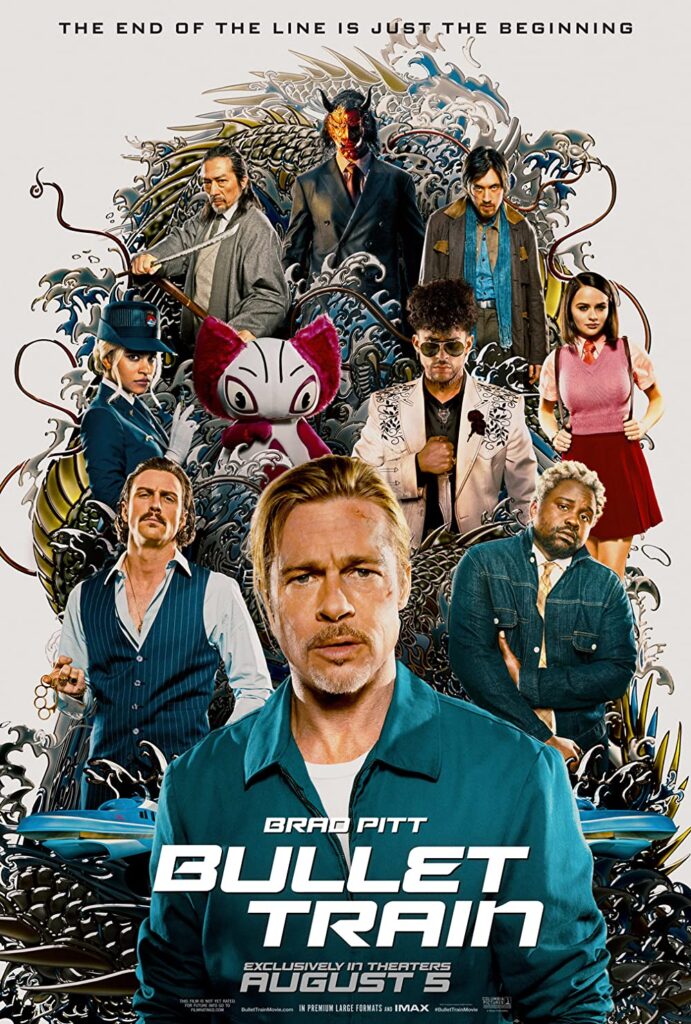 Poster of the year?
Poster of the year?
This is a PANDEMIC SPECIAL.
It was a movie created specifically to be produced during the pandemic. Almost the entire film is shot on a tight movie set (a series of train cars). And you can definitely feel that while you’re watching it. Even when the actors are pretending to be in mortal danger, I don’t think we ever really believe they are.
Bullet Train follows an assassin named Ladybug (Brad Pitt) who’s in Tokyo where his job is to grab a suitcase on a train, then get off at the next stop. Unfortunately, the guys he steals the suitcase from, Tangerine and Lemon, figure out what he’s done before he’s able to get off. So they chase him around the train to steal it back.
Meanwhile, there’s this psycho teenager girl named Prince who’s zig-zagging around the train killing people for her own nefarious purposes. Her ultimate plan is to assassinate the most fearless killer in the world, The White Death, who’s waiting at the end of the line. As we get closer to our destination, these two storylines – Ladybug’s and Prince’s – intersect, resulting in both needing to take on The White Death together.

Let me help you see just how incestuous Hollywood is.
Back in 1998, a young British director named Guy Ritchie released a cool little crime-comedy called Lock, Stock and Two Smoking Barrels. The movie was heavy on over-the-top comedic dialogue, quick cuts, and guns.
The film made Ritchie a known name in Hollywood, which attracted many a movie star who wanted to be a part of his first American production. The actor who won that lottery was mega-star Brad Pitt, who played the character of Mickey in Ritche’s “Snatch.”
As Brad Pitt’s career continued, he would need a stunt double for every project. And the man who became his main stunt double at the time was a guy named David Leitch. Leitch, along with fellow stunt man, Chad Stahlenski, muscled their way into the directing chair after a couple of decades, directing the surprise hit action film, John Wick.
Meanwhile, Brad Pitt, in what would become one of his most memorable roles, played a stunt man named Cliff Booth in Quentin Tarantino’s Once Upon a Time in Hollywood. Tarantino, of course, was a gigantic influence on the aforementioned Guy Ritchie.
Cut to last year, when Brad Pitt, he who just played a stunt man for Quentin Tarantino, a major influence on Guy Ritchie, decided to join Bullet Train, a movie directed in the same fashion as a Guy Ritchie film, where he would be directed by David Leitch, a man who, for over a decade, was Brad Pitt’s stunt double.
Crazy, right? What does it all mean?
For starters, it means don’t try to make a Guy Ritchie movie when you’re not Guy Ritchie.
But discussing Bullet Train is actually more complicated than that. This is not a bad movie. It’s not a good movie. It’s a movie that exists. And if you’re like me and into the little details about why a movie works or doesn’t work, this is a fun one to dissect. Because there isn’t any one thing that hurt this movie. Rather, it was a bunch of little bad decisions.
Before we get into the screenwriting stuff, I have to say that choosing to make a comedy when your lead actor is not a comedian, when your supporting cast are not comedians, when your director is not a comedic director, and when your writer is not a comedic writer, probably isn’t the best idea.
Comedy is very hard to pull off. If the timing is off by even half a second, it could be the difference between a big laugh or no laugh. And that was Bullet Train in a bullet shell. The timing on the jokes always felt off. We’re not talking Ben Falcone bad. But the movie felt like an approximation of how an action-crime-comedy should play. It never reached that assuredness that a Guy Ritchie would bring to the party.
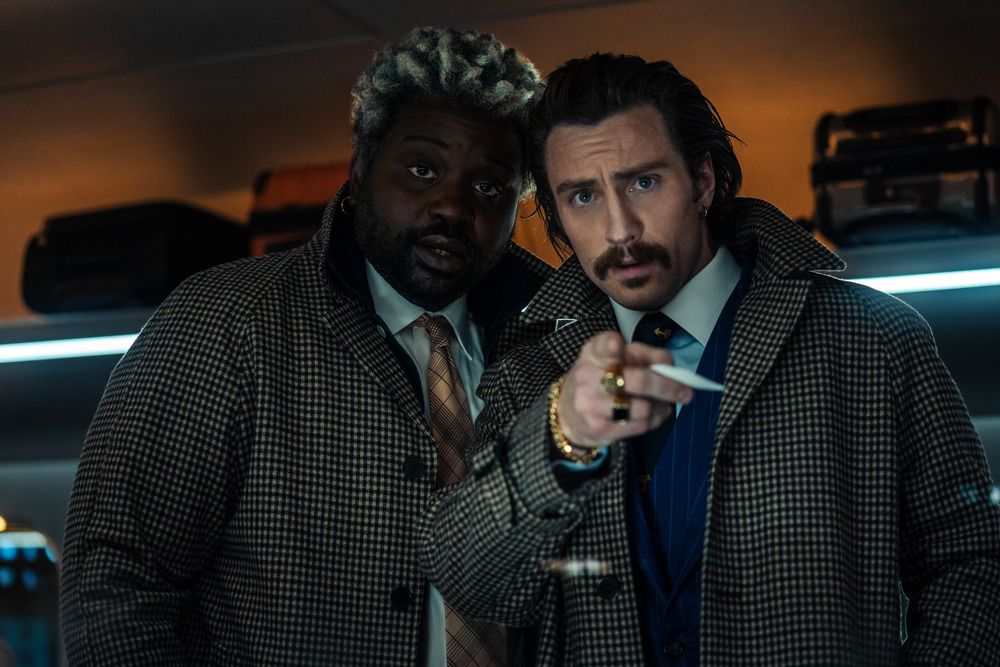
But we’re not here for the filmmaking. You can get opinions on that anywhere. We’re here for the screenwriting, baby. And the screenwriting in Bullet Train is a primary example of why flashbacks can be so dangerous.
Flashback is made up of two words.
FLASH and BACK.
“Back,” in particular, is a scary word in screenwriting parlance because stories work best when they’re going FORWARD. Not BACKWARDS.
So if you’re doing something with the word “back” in it, you’re literally going against what makes movies good.
Bullet Train is obsessed with stopping the story and doing occasional little flashbacks where we learn more about the characters’ backstories. In theory, this isn’t the worst idea. The more we know about someone, the more we’ll care about them (theoretically). So I understand the reason for the choice.
But every creative choice has a drawback to it – some bigger than others – and when you’re choosing to flash BACK, the big drawback is that YOU STOP ALL FORWARD MOMENTUM OF YOUR STORY. Believe me, the audience (and the reader) feel this.
My interpretation of how Leitch approached this device was to keep the flashbacks so fast and fun, it wouldn’t feel like the story was stopping. The problem was there were a lot of flashbacks. And, more importantly, they weren’t as cool or as funny as they were trying to be. So because they weren’t working, we felt that narrative stoppage every time a flashback arrived, and because that kept happening, the movie was never able to keep our attention. We were always drifting out then being pulled back in.
Also, when so much of your movie depends on cutesy fun dialogue, you better be lights out at writing cutesy fun dialogue. You can’t be okay at it. Or even slightly better than average, which is where I’d rank the cutesy fun dialogue in Bullet Train. If something is being done so frequently in your screenplay that it’s part of the fabric of the movie, those are the areas you have to nail. And they weren’t nailing them.
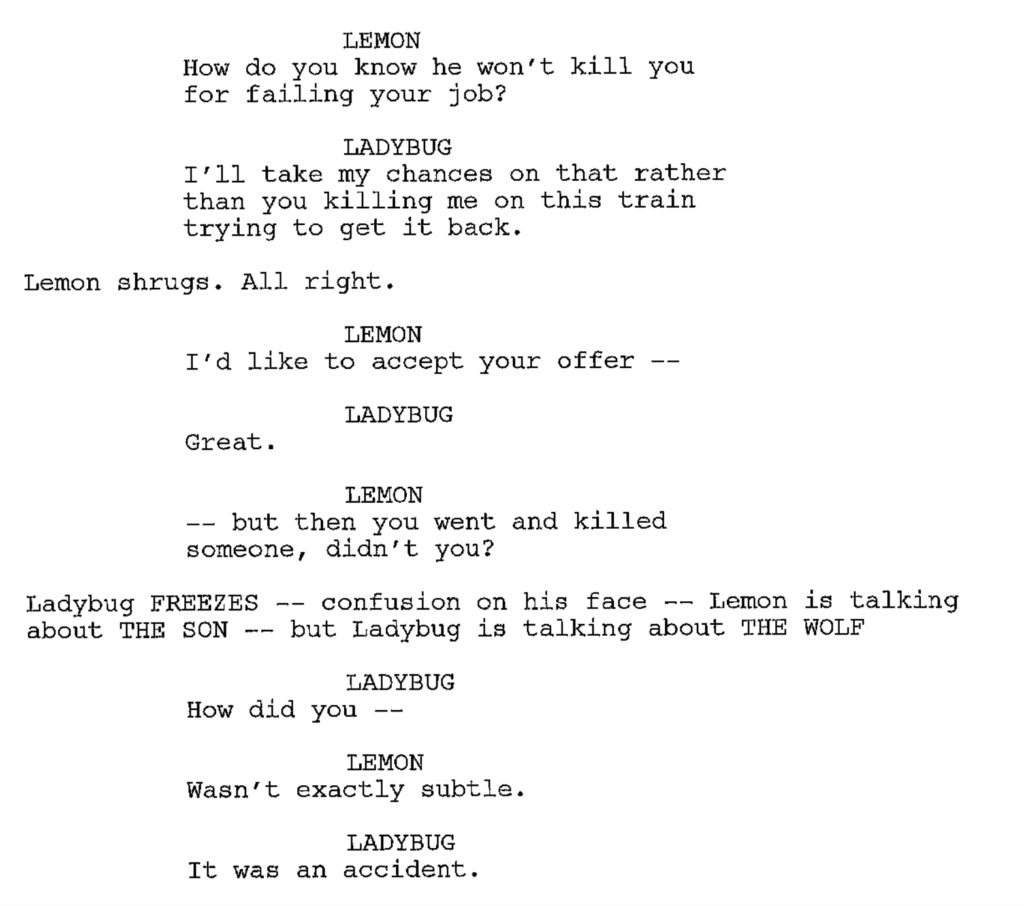
Another major error that they made on the screenwriting front was the main character, Ladybug (Brad Pitt).
They never explained him well. Is he a trained killer? Because he seems to be able to kill a lot of skilled assassins. But he acts so goofy all the time that I think we’re supposed to believe he lucks into all of these kills. That they had nothing to do with skill. Which means he’s basically Jar-Jar Binks.
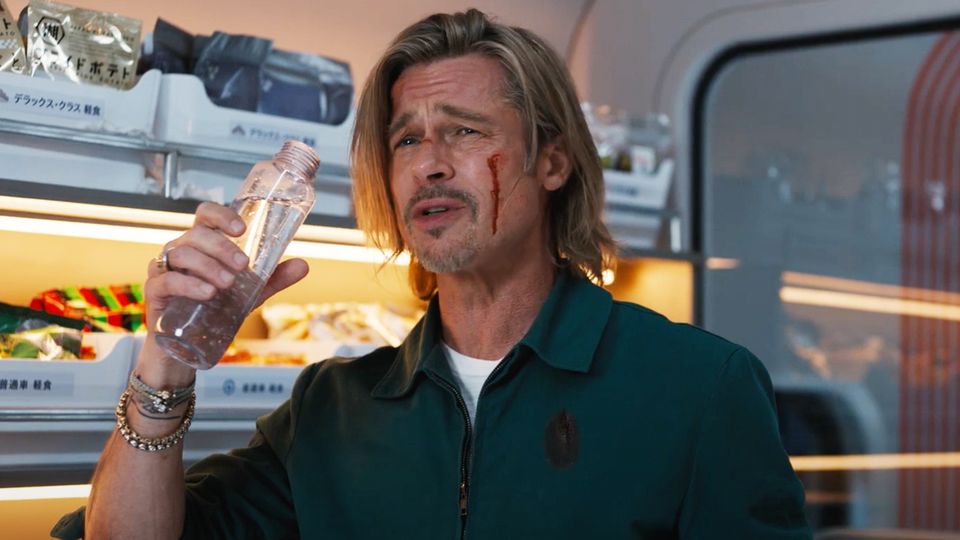
But I was never entirely clear on that. Is he good fighter? Is he a bad fighter who gets lucky? Or maybe he’s a good fighter who no longer wants to fight so he plays defense the whole time? It was confusing, man.
I will say that I liked the decision to use Maria, Ladybug’s handler, as a constant source of voice over. One of the harder things to do in a script like this (with five different assassins all chasing individual plotlines) is keep the audience up-to-date on what’s happening. By creating this handler who calls Ladybug intermittently, she can keep reminding Ladybug (and by association, us) what’s going on and what he needs to do. She can remind him, for example, that he has to get out at this next stop. And it goes both ways. Ladybug can remember out loud to Maria other relevant exposition. “Oh yeah, I remember that guy. He was at the wedding I was at where I killed the bride.”
If Maria is not in this movie, how do we get this information? Ladybug would have to talk to one of the enemy characters about it. Which wouldn’t be believable at all. It can be done, of course. But as a screenwriter, you should always be looking for strategies to attack exposition in a movie that has a lot of moving parts (and therefore will require a lot of exposition). They had a good strategy here.
I also liked the ending more than I thought I would. The movie does such a good job setting up the character of The White Death that we want to see what happens when he shows up.
And remember, whenever you’re writing a movie and you’re unsure about your climax, just go back to your concept. The answer is always in your concept. This movie is called Bullet Train. Therefore, the movie needs to have a big splashy bullet train crash. And they don’t disappoint. If you’ve ever asked the question, what happens to a bullet train when it runs out of track, this movie gives you the answer. I point this out because there was a moment where it looked like they were going to end the movie at the Kyoto stop with a big flashy fight just outside the train. That ending would have been disastrous.
If I had just one word to describe Bullet Train, it would be, “frustrating.” There was definitely a good movie in here, but the decision to turn it into a comedy when nobody involved is known for comedy was kinda fatal. If this were a streaming movie, I’d tell you to watch it for sure. But I can’t, in good conscience, say it’s worth paying for in theaters.
[ ] What the hell did I just watch?
[x] wasn’t for me
[ ] worth the price of admission
[ ] impressive
[ ] genius
What I learned: Physical movement is powerful in visual storytelling mediums. If we’re physically moving towards something, it creates the illusion of importance later on since the audience naturally want to see where the movement stops. That’s what kept Bullet Train just watchable enough, was the need to see where the train stopped. But you can do this with characters moving (1917) you can do it with a vehicle (Mad Max). You can do it in a spaceship (Passengers). Movement is typically preferable to stillness in movies. Which should be evident from the word itself – “Movie.” Aka, “Moving.”
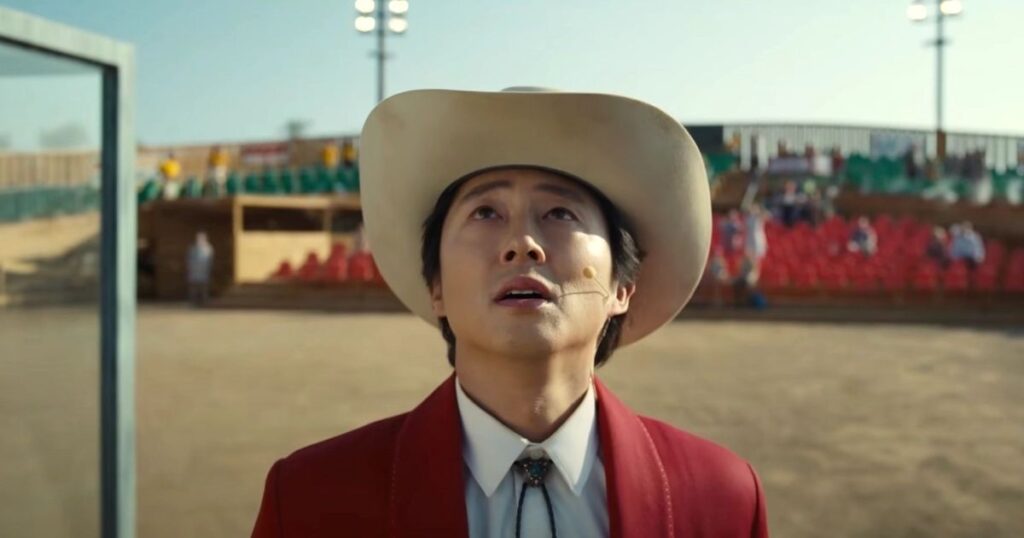
I’m not going to lie. I’m fascinated by Jordan Peele’s “Nope.”
Now that I’ve had some time to reflect on the film, I better appreciate what Peele has done. He swung for the fences in an industry that locks you in a batting cage. There’s something big and crazy and mystical about this movie that makes it unlike any other movie experience this year. And that’s to be admired.
But “Nope” is also a shining example of what an unfinished spec script looks like when it’s up on screen. It’s uneven. It’s sloppy. The main character isn’t very likable. The climax lacks clarity. You can feel the story trying to find itself as the movie is happening.
 Who the f@%& is this character???
Who the f@%& is this character???
Which is what I want to talk about today. A finished script should never read like the writer is still playing with ideas, still trying to figure things out. Your script should have a certainty behind it. It should feel solid, like it always knows where it’s going.
To understand why this happens, you must first understand that a screenplay is a living breathing thing. We think we know our story when we start writing it. But, often times, we’ll discover new things that weren’t in the original plan. And, as an artist, it’s our duty to explore those new avenues to see if there’s anything there.
The most famous example of this is Good Will Hunting.
That movie started off as a thriller chronicling a genius mathematician who’s being pursued by the government for his abilities. But the drafts that Matt Damon and Ben Affleck were writing showed much more promise in the story’s character development, particularly the relationship between Will and his psychiatrist.
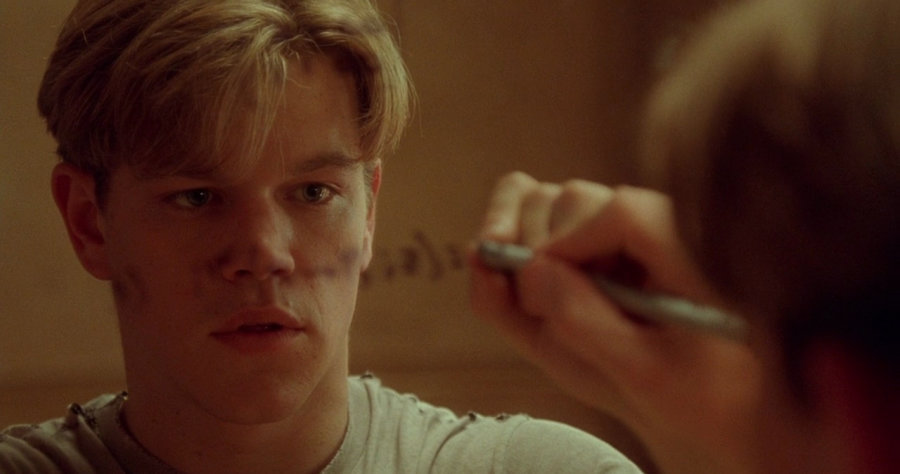
Matt and Ben did not want to change their story. But they were unknown back then and, in order to get the movie made, had to do what Castle Rock, who owned the rights, wanted them to do. So they scrapped the thriller angle and made it a character piece. The rest is history.
Part of what drafts 2, 3, 4, and 5 are about is identifying what’s working in your script and what’s not working, then leaning into the stuff that’s working. Just like Matt and Ben didn’t expect Psychiatrist Sean to be as interesting a character as he was, you might come up with a character, in the heat of writing, who you never thought of before you started, and that character might turn out to be a game-changer.
It’s in your best interest to then rethink your story to better incorporate that character. If that changes your movie – heck, even if it changes your genre – you have to consider it. That doesn’t mean you *have to* to deviate from your original vision every time this happens. But you should certainly weigh the pros and cons of the new option before writing it off.
I can’t help but think of this when reflecting on “Nope.”
Jordan Peele clearly had this vision of two Hollywood horse ranchers who discover that a UFO might be killing their horses. Admittedly, when you get that original idea in your head, it’s very hard to move away from it. So I suspect that once he had that idea, he never considered deviating. Which is too bad. Because it prevented him from writing a much better movie.
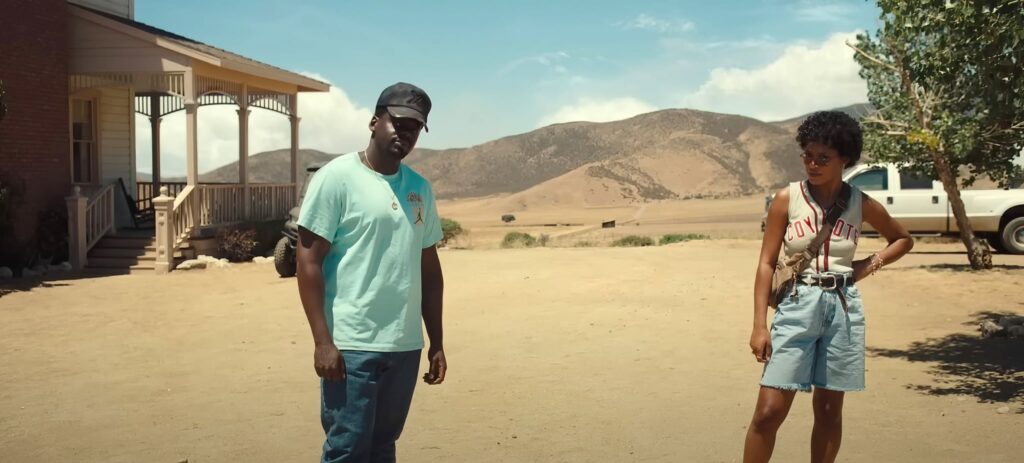
I don’t know how Peele conceived of the Ricky subplot. But based on his interviews and how obsessed he was with this monkey-massacre sitcom backstory, I assume it went something like this.
Peele had his crazy horse rancher UFO story over on one side. But he’d read about that story years ago (which we all did) about a monkey that tore its female owner’s face off. And he was so haunted by it that he just HAD to get it into his movie somehow. But how?
It would be too weird if the monkey massacre happened in the present. It would detract from the UFO-horse stuff. So he knew he had to put it in the past. Okay, well, how do we tie some crazed monkey backstory to the present? Maybe we have the woman whose face the monkey ripped off, many years later, involved in the story somehow.

They have animals in movies and TV shows all the time. What if this monkey was on a sitcom? And he didn’t just tear one person’s face off, he went ballistic and started attacking everyone on set? Okay, that’s cool. What if there’s a kid on this sitcom and he somehow comes away unscathed? And what if, many years later, he has his own little Western theme park out in the boondocks, not far from our horse ranchers? Okay, now we’re gradually finding tentacles to connect these two storylines.
Unfortunately, that’s as far as Jordan Peele went. Ricky (the kid from the sitcom) was going to be a supporting character in the movie.
This is the critical moment as an artist where you need to step back and objectively ask the question: Which of my two storylines is more interesting? The former kid sitcom star who survived a horrific monkey attack that killed two of his cast members and ripped the face off another, who’s put together a theme park where he tries to lure in UFOs… or a couple of horse ranchers who occasionally rent their horses to Hollywood?
Is it even a competition?
One’s a 9 out of 10 on the interesting scale.
The other is a 4 out of 10 at best.
Not only that but you could easily slide many of the current story elements over to the Ricky plot. For example, Ricky needs horses too. So if you really wanted to do the horse thing, you still have your horses as a main part of the plot. You could’ve even kept OJ. Have OJ begrudgingly working for Ricky. When the sh#t hits the fan, Ricky and OJ have to team up, which, unlike what they currently have, would’ve been fun to watch, since OJ doesn’t like Ricky.

Now some of you may be saying, “Hold on, Carson. Let’s play this out with some other movies. What about Star Wars? Han Solo had a way more interesting life than Luke Skywalker. Are you saying that George Lucas should’ve scrapped the whole Luke Skywalker Obi-Wan journey and made Star Wars, “The Adventures of Han Solo” instead? Cause we later saw the Han Solo movie. And it sucked.”
Totally fair argument. But I would combat that by saying while, yes, Han was the cooler character, Luke and Obi-Wan had the way better story. And since Han becomes a big part of the team after they meet anyway, we get all the Han Solo we can handle.
Here, Ricky has the better storyline AND is the more interesting character. He has the better story because he has an actual theme park he’s running. He’s putting all his resources into this new show. He doesn’t know if it’s going to work or not. If it doesn’t, it might bankrupt his whole business. Just as I’m writing this out, I’m imagining a 20 times better movie.
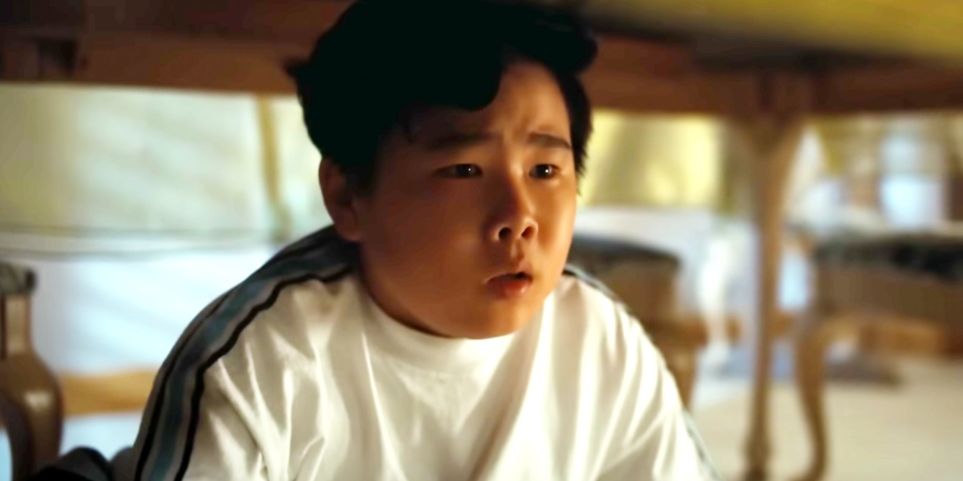
Ricky is also a guy who went through the most traumatic experience a kid could possibly go through. Yet here he is today, chipper and upbeat, always in a good mood. He clearly hasn’t dealt with that trauma. If we had more time with him, we’d be able to build more of an arc into that disconnect and see what happens when he finally breaks down and accepts what he saw.
So why did we build the story around the ranchers again?
One of two reasons, likely. As I said, once Peele locked into this idea of ranchers, he couldn’t let it go. He just had to tell the story from their point of view because they’re who he originally envisioned going through this. Another possibility is that he simply ran out of time. Unlike his 10 year journey writing Get Out, I’m guessing Universal dictated the release date of this film, which was strict enough that it prevented Peele from writing as many drafts as he would’ve wanted.
Which sucks because, he might’ve eventually figured this out. It’s clear to everyone who watched the movie that he was way more into Ricky’s storyline than the ranchers. That whole world of Ricky’s was like a sandbox full of toys. Every direction you looked (his current rodeo show, his old sitcom, killer monkeys, a weird theme park, maimed co-workers from his past) there was something to play with. Yet we instead get scenes like being stuck in Angel’s apartment while our three loser protagonists smoke weed together. It’s like, “uhhhh, I think there’s a better movie over this way, guys?”
Use this as a cautionary tale. Our minds are wonderful creative instruments and, sometimes, they come up with inspiration in the most unexpected of places. It could be that you’re writing a zombie movie and conceive one of your characters as an amazingly weird and captivating chess player. If Chess Guy is, far and away, the best thing about your zombie script, maybe you shouldn’t be writing a zombie script anymore.
Believe me, I know these choices aren’t easy. The more time you’ve invested in a storyline, the less motivation you have to change it. And, of course, there’s the danger of changing your mind *too much*. If you keep changing your script’s direction every time you come up with a new idea, you’re never going to finish. But if you encounter a scenario like Jordan Peele’s, “Nope,” where the subplot is actually way cooler than the main plot, you have to at least entertain the change. Cause I believe Jordan Peele missing the cue that Ricky was the main plot for Nope was the difference between making an okay movie and a great one.
Are you looking for help on your latest screenplay? – Let someone who’s read over 10,000 scripts identify your screenplay’s weak points and how to fix them. I have a 4 page notes package (2300-2500 words) or the more detailed 8 page option (4600-5000 words). I also give feedback on loglines, outlines, synopses, first acts, or any aspect of screenwriting you need help with. This includes Zoom calls discussing anything from talking through your script to getting advice on how to break into the industry. If you’re interested, e-mail me at carsonreeves1@gmail.com and let’s set something up! I look forward to working with you.
Genre: Comedy
Premise: A successful illustrator finds herself friendless after her best friend gets engaged, forcing her to embark on an epic quest to “date” for new girlfriends — as an adult.
About: Scarlett Bermingham has written on a few small TV shows, including “Epic Night,” and “Damage Control.” She’s also had a few small roles as an actress. This script of hers made it onto last year’s Black List.
Writer: Scarlett Bermingham
Details: 115 pages
 Slate for Mimi?
Slate for Mimi?
How many big ideas do you need for a concept?
There’s a belief that one isn’t enough. That you need a second one to make it truly original.
For reference, a “single idea” concept would be Top Gun: Maverick. A famous flight instructor comes back to Top Gun flight school to teach a new generation of pilots how to fly. A “double idea” concept would be “Nope.” It starts off as horror-mystery movie. Then it turns into an alien/UFO movie. Or the recent spec sale, Classified. It’s a heist movie AND a supernatural Indiana-Jones type movie.
Because my screenwriting philosophy is “keep it simple,” I lean towards one idea. But this topic is open for debate. You can find examples of both types of movies working.
When I read the concept for Mimi on the Black List, I was immediately intrigued. Instead of dating to find a boyfriend or girlfriend, you’re “dating” to find a friend. It was a solid “single idea” concept.
But then you open the script and are attacked by this secondary element of a cartoon world. Every scene involves a break into the cartoon version of what’s happening to Mimi. All of a sudden, you’re in “double idea” territory which means your enjoyment of the script will depend on if you’re a “single idea” or “double idea” person.
30 year-old Mimi works as an illustrator at a billboard advertising center. Mimi is one of those people who’s only ever needed one great friend. And that friend is Caroline. They’ve been BFFs since they were kids.
But, lately, Caroline keeps hanging around her new boyfriend, Kip, who Mimi thinks is a loser. As the weeks go by, Caroline is replying less and less to Mimi’s texts, until Caroline stops texting altogether. A couple months later, Mimi sees on social media that Caroline and Kip are getting married.
It’s around this time that Mimi gets the hint that Caroline is upset about something. But Mimi is too proud to call her and ask what. Which creates a new dilemma for her. Who’s going to be her new best friend? She’s got to find one.
Mimi quickly learns that making friends as an adult is a lot harder than making friends as a kid. She goes to pottery classes, scaring potential friends away with her “Let’s be friends now!” energy. She tries to make friends with her neighbor, who finds her way too overbearing. She even goes as far as to join a “Friend” version of Tinder and go on Tinder Friend dates.
For some reason, Mimi can’t make friends with anyone. She then becomes infuriated when she learns that there’s an actual date for Caroline’s wedding and SHE WASN’T INVITED. So she does what any scorned lover would do – she crashes the wedding!
There, she confronts Caroline, who tells her that Mimi is the embodiment of a selfish friend. It’s always about her. And that Caroline doesn’t want to be her friend anymore. Unfortunately, there is no happy ending here. The two go their separate ways and… that’s it.
Like I was saying earlier, I would’ve liked this a lot better without the animation. I suppose it will add visual flair to the movie itself, which might change my mind. But to me I saw it as a writer admitting that they didn’t believe in their idea enough. The original logline, sans animation, is funny! Trust that. I don’t think you need to add a bunch of bells and whistles to distract people in case it’s not enough.
Also, I felt the script could’ve done a lot more on the comedic side. I kept waiting for that big scene that was going to truly take advantage of the premise, but it never happened. We’d get funny little moments here and there – like Mimi coming on to a potential friend too hard and the friend being scared off. But that laugh takes up 5 seconds of the total screenplay. You need funny set-pieces that last FIVE MINUTES.
The 40 Year Old Virgin is a good example of this. You place a 40 Year Old Virgin on a date with a girl who makes it extremely clear she wants to have sex with him at the end of the night, and then you throw a ton of obstacles at the date (she gets egregiously drunk) which slowly and meticulously destroys the opportunity for said sex. A lot of comedy comes from us watching our main character’s misery.
We didn’t have that scene in “Mimi.”
But there were a couple of things I liked. The first was the choice not to explore the friendship between Mimi and Caroline. In fact, Caroline is absent the entire movie. (Spoilers) Normally, these movies are about repairing the central relationship. But we go 180 degrees in the opposite direction. Not only do we not explore the main relationship, but in the final confrontation, the characters go their separate ways. There is no happy resolution. That’s a very bold choice for a comedy.
I also liked what precluded the confrontation. Once we move away from the muted shenanigans of the first and second acts, we find Mimi truly exploring why she’s unable to have friendships. That was the first time in the script where I actually started to feel something. Cause a lot of what was said was truthful – how friendships are messy and how, if you take more than you give, sooner or later the other party is going to say, “Enough is enough.” Ultimately, Mimi needs to learn how to give more in friendships. That’s her big character journey.
And, to top it off, the script has a nice little epilogue where Mimi learns she’s already made friends with her neighbor without realizing it.
These scripts always mess with my head because I didn’t think much of the first two acts, but the third act really worked for me. And since it’s the most recent act, I’m tempted to give the script a ‘worth the read.’ But that’s still 75% of the script that I wasn’t on board with. So I’m not saying this is worth the read. But it *is* an interesting script in places and should not be easily dismissed.
P.S. Very clever name for a selfish main character – Mimi (“Me” “Me”).
[ ] What the hell did I just read?
[x] wasn’t for me
[ ] worth the read
[ ] impressive
[ ] genius
What I learned: Any time you feel like you need to add CRAZY VOICE OVER or ANIMATION or YOUR MAIN CHARACTER BREAKS THE FOURTH WALL A LOT or SPEAK DIRECTLY TO THE READER THROUGH THE DESCRIPTION – ask yourself why you’re doing this. If you’re doing it because you genuinely believe it makes the script better, include it. But if you’re just doing it because you’re worried the story itself isn’t enough, you need to take a hard look at your concept and figure out if you really want a write it. No supplemental entertainment factor is going to save a weak premise. And, in some cases, like today’s script, it can actually get in the way of a fun idea.
Today’s script has a very real shot at becoming a future Oscar contender!
Genre: War
Premise: JULY 20, 1942: Russian composer Dmitri Shostakovich becomes known around the world for writing an epic symphony during the deadly World War II siege of Leningrad.
About: This script finished fairly high on last year’s Black List and is, surprisingly, the only World War 2 script that made the esteemed list. While Daniel Persitz does not have any previous writing credits, he was a producer on the 2014 horror film, Ouija.
Writer: Daniel Persitz
Details: 117 pages

One of the early lessons I learned about screenwriting was that they will never ever run out of movies to make about World War 2. I thought they’d scraped the bottom of the barrel and that was 20 years ago. I was wrong. Hollywood will scrape the blood off the carcass of a dead World War 2 soldier if there’s even a SLIVER of a new movie concept in it.
At first glance, writing a symphony seems low stakes in the shadow of one of the most devastating wars ever. But let’s not forget, they made a World War 2 movie about a piano. A piano! A symphony has, like, what? 30 more instruments? Which, by the power of maths, means it must be 30 times better. Right?
Stop being such a film snob and agree with me.
The year is 1937 and famous Russian composer, Dmitri Shostakovich, has just finished his latest musical, Lady MacBeth. While Dmitri is the 1937 celebrity equivalent of Drake in Russia, the tide has been turning against Russian artists lately. Joseph Stalin, threatened by the new ideas that art contains, is quietly disappearing Russian artists across the land. During Lady MacBeth, he stomps out mid-performance, implying that it won’t be long before Dmitri disappears too.
Things only get worse as this new German rabble-rouser, a guy named Hitler, starts taking over Europe. Tensions grow because even though Stalin and Hitler make a deal to be friends, Hitler is becoming unpredictable. And then it happens. Hitler invades Russia, storming up north through the giant country.
At a certain point Dmitri, along with his wife, Nina, his mother, Sofia, his father and his two children, start getting worried. They’re safely tucked inside Leningrad at the moment. But Hitler’s forces relentlessly move north, getting closer and closer to the city. Nina freaks out, demanding that they leave. But it’s inconceivable to Dmitri that Leningrad could fall so he says, “let’s stay, it’ll be fine.” It’s a critical error, because soon, the city is surrounded. There’s no way out.
Dmitri passes the time by writing his seventh symphony, inspired by the atrocities of war – the bombing, the starvation, the hopelessness. Every day, through thick and thin, he keeps writing that symphony. Then, when the city is devastated and without hope, word travels about Dmitri’s determination, and he’s invited onto Leningrad radio. In one of the most powerful moments of the war, he tells the Russians to remain defiant. That the Germans can’t stop him from working. He’s still writing his symphony. They, too, should keep working, keep resisting.
His speech is so powerful that Stalin himself orders Dmitri to be rescued from Leningrad. He’s allowed to bring his wife and kids, but not his parents. Dmitri is then ordered to finish his symphony as soon as possible as Stalin believes it will inspire other countries, particularly America, to join the war. But Dmitri is more concerned with his parents. He asks, if he can deliver the symphony, can his parents be rescued? Stalin’s right-hand man says, “We’ll try.” That’s enough for Dmitri, who puts everything he’s got into finishing that darn symphony.
This was pretty freaking good.
I went in wondering why I was going to care about a man finishing a symphony. And while the plot itself never convinced me it was a necessity. From a character perspective, I liked Dmitri so much, that I wanted to see him finish.
I always try to figure out the exact reason (even the exact moment) why I like or dislike a hero. Because that’s usually the moment in a script that determines everything that follows. If you don’t like the hero, you’re probably not going to like the story. If you do, you probably are.
So it’s worth it, whenever you watch a movie that you like or read a script that you like, to figure out exactly where you started liking the character. For me, it was two-fold. When I heard that Soviet artists were being killed, I felt this immediate fear for Dmitri. He was vulnerable. For making music of all things. Audiences don’t like when people are unfairly attacked. So, right away, we feel sympathy for him.
And then Persitz got more specific. He had Stalin show up to Lady MacBeth and have him hate it. Now we really hate Stalin, cause he hates our guy’s music. So we want Dmitri to thrive so he can prove him wrong. But again, it’s that base setup of someone being unfairly threatened/attacked that ensured we would root for Dmitri.
But the script still had a tough mountain to climb. The story takes place over five years. That’s a long time in movies. Most movies do well with a short timeframe – under two weeks if possible. However, war movies are one of the few genres that do well with passing time because there’s an organic-ness to watching the toll of war play out over time.
And Persitz makes good use of the time. He makes sure that things keep getting worse for his hero. First, it’s bad enough in Leningrad that people start evacuating. Then, people start need ration cards. Then, the city starts getting bombed. Then, the city is surrounded, as the Germans try to starve the population out.
Just when that starts to feel repetitive, Persitz introduces the “radio interview” scene, which allows Dmitri and his family to get out of the city. And that gives the narrative new life, since we’re in a new place. This plotline is subsidized by Dmitri’s determination to save his parents (the stakes) and this newfound excitement around this defiant composer who’s writing a symphony while his city is being bombed. It’s inspiring stuff.
If I have a gripe, it’s that the symphony isn’t tied enough to the war. The writer makes all these inferences that the symphony is going to inspire the world. But I wasn’t ever sure what that meant, or if I even believed it. Granted, I don’t know what it was like living in 1941, or what the music scene was back then. But I find it hard to believe that all the kids are waiting by the radio for that new 1 and a half hour song with lots of old-timey instruments and no singer.
Still, the writer does an exceptional job of making us like and care about the hero. The circumstances surrounding the goal make everything feel big and important. Even with a sketchy connection to the war, I was tearing up when composers around the world played Dmitri’s music.
It really does have that juicy Oscar feel to it. More importantly, it’s a good script. I recommend checking it out!
Script link: Symphony of Survival
[ ] What the hell did I just read?
[ ] wasn’t for me
[ ] worth the read
[x] impressive
[ ] genius
What I learned: Beware “out of character” character introductions. Here’s a line early in the script. “He’s pulled aside by ISAAC GLIKMAN (25), his secretary and friend. A sophisticated intellectual who usually exudes warmth, at the moment Glikman fidgets with anxiety.” Notice that normally, Glikamn is sophisticated. That’s his true character. But we’re meeting him acting the exact opposite (“fidgets with anxiety”). The reason this is problematic is because readers put a ton of stock into how a character acts when they’re introduced. So if a character is a jerk, it doesn’t matter if you say in the description, “He’s normally nice.” Actions speak louder than words and right now, this guy is acting like a jerk, so that’s how we’re going to see him. For this reason, ALWAYS avoid out-of-character character introductions for your protagonists. And try your best to introduce every supporting character IN CHARACTER. If you absolutely positively can’t do that, then you can do what Persitz does here. But it should be your last option.

